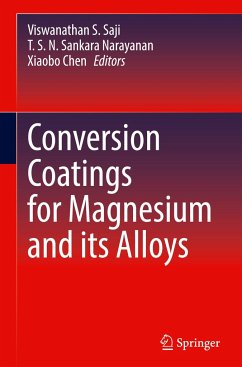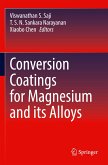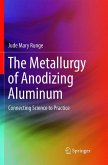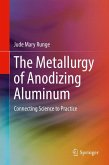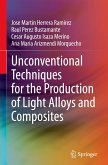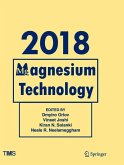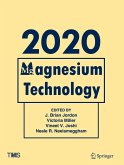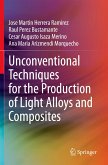Conversion Coatings for Magnesium and its Alloys
Herausgegeben:Saji, Viswanathan S.; Sankara Narayanan, T. S. N.; Chen, Xiaobo
Conversion Coatings for Magnesium and its Alloys
Herausgegeben:Saji, Viswanathan S.; Sankara Narayanan, T. S. N.; Chen, Xiaobo
- Gebundenes Buch
- Merkliste
- Auf die Merkliste
- Bewerten Bewerten
- Teilen
- Produkt teilen
- Produkterinnerung
- Produkterinnerung
This book covers fundamentals and recent advancements on conversion coatings for magnesium and its alloys. The contents are presented in two sections, respectively dealing with chemical and electrochemical conversion coatings. The chemical conversion coating section is further subdivided into inorganic conversion coatings, organic conversion coatings and advanced approaches/coatings. The section on electrochemical conversion coatings spans from fundamentals to state-of-the-art progress on electrochemical anodization and plasma electrolytic oxidation of magnesium and its alloys.
Andere Kunden interessierten sich auch für
![Conversion Coatings for Magnesium and its Alloys Conversion Coatings for Magnesium and its Alloys]() Conversion Coatings for Magnesium and its Alloys137,99 €
Conversion Coatings for Magnesium and its Alloys137,99 €![The Metallurgy of Anodizing Aluminum The Metallurgy of Anodizing Aluminum]() Jude Mary RungeThe Metallurgy of Anodizing Aluminum81,99 €
Jude Mary RungeThe Metallurgy of Anodizing Aluminum81,99 €![The Metallurgy of Anodizing Aluminum The Metallurgy of Anodizing Aluminum]() Jude Mary RungeThe Metallurgy of Anodizing Aluminum130,99 €
Jude Mary RungeThe Metallurgy of Anodizing Aluminum130,99 €![Unconventional Techniques for the Production of Light Alloys and Composites Unconventional Techniques for the Production of Light Alloys and Composites]() Jose Martin Herrera RamirezUnconventional Techniques for the Production of Light Alloys and Composites121,99 €
Jose Martin Herrera RamirezUnconventional Techniques for the Production of Light Alloys and Composites121,99 €![Magnesium Technology 2018 Magnesium Technology 2018]() Magnesium Technology 2018114,99 €
Magnesium Technology 2018114,99 €![Magnesium Technology 2020 Magnesium Technology 2020]() Magnesium Technology 2020162,99 €
Magnesium Technology 2020162,99 €![Unconventional Techniques for the Production of Light Alloys and Composites Unconventional Techniques for the Production of Light Alloys and Composites]() Jose Martin Herrera RamirezUnconventional Techniques for the Production of Light Alloys and Composites121,99 €
Jose Martin Herrera RamirezUnconventional Techniques for the Production of Light Alloys and Composites121,99 €-
-
-
This book covers fundamentals and recent advancements on conversion coatings for magnesium and its alloys. The contents are presented in two sections, respectively dealing with chemical and electrochemical conversion coatings. The chemical conversion coating section is further subdivided into inorganic conversion coatings, organic conversion coatings and advanced approaches/coatings. The section on electrochemical conversion coatings spans from fundamentals to state-of-the-art progress on electrochemical anodization and plasma electrolytic oxidation of magnesium and its alloys.
Produktdetails
- Produktdetails
- Verlag: Springer / Springer International Publishing / Springer, Berlin
- Artikelnr. des Verlages: 978-3-030-89975-2
- 1st edition 2022
- Seitenzahl: 596
- Erscheinungstermin: 2. Februar 2022
- Englisch
- Abmessung: 241mm x 160mm x 36mm
- Gewicht: 1159g
- ISBN-13: 9783030899752
- ISBN-10: 3030899756
- Artikelnr.: 62618508
- Herstellerkennzeichnung Die Herstellerinformationen sind derzeit nicht verfügbar.
- Verlag: Springer / Springer International Publishing / Springer, Berlin
- Artikelnr. des Verlages: 978-3-030-89975-2
- 1st edition 2022
- Seitenzahl: 596
- Erscheinungstermin: 2. Februar 2022
- Englisch
- Abmessung: 241mm x 160mm x 36mm
- Gewicht: 1159g
- ISBN-13: 9783030899752
- ISBN-10: 3030899756
- Artikelnr.: 62618508
- Herstellerkennzeichnung Die Herstellerinformationen sind derzeit nicht verfügbar.
Viswanathan S. Saji is a Research Scientist III/Assistant Professor at the Interdisciplinary Research Center for Advanced Materials, King Fahd University of Petroleum and Minerals (KFUPM), Saudi Arabia. He received M.Sc. (1997), M.Phil. (1999) and Ph.D. (2003) degrees from the University of Kerala, India. He was a Research Associate at Indian Institute of Technology (IIT) Bombay (2004-2005) & Indian Institute of Science (IISc) Bangalore (2005-2007), Postdoctoral Researcher at Yonsei University (2007-2008) & Sunchon National University (2009), Senior Research Scientist at Ulsan National Institute of Science and Technology (UNIST) (2009-2010), Research Professor at Chosun University (2008-2009) & Korea University (2010-2013), and Endeavour Research Fellow at University of Adelaide (2014). He has authored 75 journal publications, contributed 8 books and 15 book chapters. He has more than 50 conference presentations and invited talks. His research interest lies in electrochemistry, corrosion science, and smart materials. TSN Sankara Narayanan is a Research Scientist specialized in the areas of surface engineering, corrosion, nanomaterials and biomaterials. He obtained his doctoral degree in chemistry from University of Madras, Chennai, India in 1992. He was a postdoctoral fellow at Baylor University, Texas, USA during 1994-1997, senior research associate at Indian Institute of Technology Madras, Chennai, India during 1997-1998, scientist in CSIR-National Metallurgical Laboratory, Chennai, India during 1998-2012, visiting scientist under Brain pool program at Yonsei University, Seoul, Republic of Korea during 2005-2006, Research Professor at the Department of Dental Biomaterials, School of Dentistry, Chonbuk National University, Jeonju, Republic of Korea during 2012-2017 and Research Professor at Ulsan National Institute of Science and Technology (UNIST), Ulsan, Republic of Korea during 2018-2019. He has published 200 papers and 10 book chapters. He is the principal editor of the two-volume series on Surface modification of magnesium for biomedical applications, published by Elsevier Science. He has two patents to his credit. His papers have been cited more than 8468 times with h-index of 48 and i-10 index of 104. Besides his research and development work, he is also a freelance science writer and an educational consultant. Xiao-Bo Chen received his PhD in Materials Science and Engineering from Deakin University, Australia in 2009 and then joined the Department of Materials Science and Engineering at Monash University as Postdoctoral Research Fellow, DECRA Awardee and Senior Research Fellow (2009-2017). Since March 2017, Dr Chen has been working at RMIT University as Vice-Chancellor Senior Research Fellow and now Senior Lecturer, in the School of Engineering. His research aims to provide functional characteristics upon the surface of light metals to meet the requirements for a large range of engineering applications in automotive, 3C and biomedical industries. Dr Chen has achieved 157 Scopus publications with 4800+ citations and h-index of 39. Dr Chen has attracted over 5M research funding from the Australian Research Council and industrial partners as Lead Investigator
Conversion Coatings - Types and Mechanism.- Fundamentals of Chemical Conversion Coatings.- Fundamentals of Electrochemical Conversion Coatings.- Other Conversion Coatings Approaches.- Chromium Conversion Coatings -Present Status.- Phosphate-based Conversion Coatings.- Rare Earth-based Conversion Coatings .- Permanganate, Molybdate and Vanadate Conversion Coatings.- Fluoride Conversion Coatings.- Carbonate Conversion Coatings.- Layered double hydroxide conversion coatings.- Other Conversion Coatings .- Phytic Acid Conversion Coatings.- Tannic and Gallic Acid Conversion Coatings.- Aliphatic Carboxylic Acid Conversion Coatings .- Catechol and Vanillic Acid Conversion Coatings.- Other Conversion Coatings.- Electrochemical Anodic Oxidation of Mg alloys- Fundamentals and Recent developments.- Plasma Electrolytic Oxidation of Mg alloys - Fundamentals and Recent developments.- Recent Research Advancements in superhydrophobic electrochemical conversion coatings for Mg.- Self-healing Conversion Coatings.- Ionic Liquids-assisted Conversion Coatings.- Superhydrophobic Conversion Coatings.- Chitosan-based coatings.- Silane-based Coatings.
Conversion Coatings - Types and Mechanism.- Fundamentals of Chemical Conversion Coatings.- Fundamentals of Electrochemical Conversion Coatings.- Other Conversion Coatings Approaches.- Chromium Conversion Coatings -Present Status.- Phosphate-based Conversion Coatings.- Rare Earth-based Conversion Coatings .- Permanganate, Molybdate and Vanadate Conversion Coatings.- Fluoride Conversion Coatings.- Carbonate Conversion Coatings.- Layered double hydroxide conversion coatings.- Other Conversion Coatings .- Phytic Acid Conversion Coatings.- Tannic and Gallic Acid Conversion Coatings.- Aliphatic Carboxylic Acid Conversion Coatings .- Catechol and Vanillic Acid Conversion Coatings.- Other Conversion Coatings.- Electrochemical Anodic Oxidation of Mg alloys- Fundamentals and Recent developments.- Plasma Electrolytic Oxidation of Mg alloys - Fundamentals and Recent developments.- Recent Research Advancements in superhydrophobic electrochemical conversion coatings for Mg.- Self-healing Conversion Coatings.- Ionic Liquids-assisted Conversion Coatings.- Superhydrophobic Conversion Coatings.- Chitosan-based coatings.- Silane-based Coatings.

